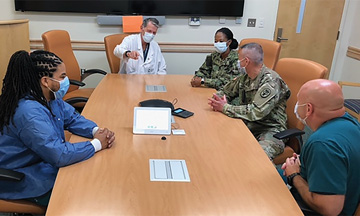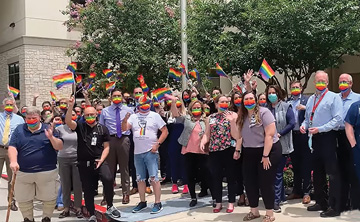Efforts to ensure members of the LGBTQ+ community feel welcome at Methodist Hospital Metropolitan in San Antonio began five years ago in the maternity ward, where a woman and her partner welcomed their first child. The joyous time for the same-sex couple was even more special because of the attentive care they received. “They told us how comfortable the staff made them feel, and how that made the occasion that much more meaningful,” says Minerva Gorjon, MBA, Methodist’s human resources vice president. “That inspired us to make sure the entire hospital was welcoming for all patients.”
The inclusive initiatives the hospital’s leadership and staff continue to implement on a daily basis have earned the hospital this year’s OR Excellence Award for Diversity, Equity and Inclusion.
All patients are asked about their preferred pronouns, so every member of the care team addresses them in a way that makes them feel comfortable. Sandy Gallegos, BSN, RN, CNOR, administrative director of surgical services, communicates the preferred pronouns to members of the hospital’s admission staff, who are the first people patients interact with upon their arrival for surgery.
“Charge team leaders also huddle to review the next day’s cases and discuss how patients want to be identified, and share the information with the frontline staff who will be caring for them,” says Ms. Gallegos. “We make sure a patient’s preferred pronoun is known throughout the continuum of care, and is used during their entire stay.”
Staff members are attuned to the needs of patients and their families, says PACU Manager Valerie Huerta, MSN, RN, CSSM, CPAN. “We provide extensive sensitivity training, and every nurse completes a sensitivity course annually,” she adds. “This ensures our team is prepared to provide patients with a welcoming experience.”
Methodist has implemented HIV testing at no cost for all patients who visit the emergency department. The test is performed unless patients opt out. The hospital’s healthcare benefits cover sex reassignment surgery and the hormonal therapy patients undergo during the transition. The benefits also extend to the same-sex spouses of employees.
.svg?sfvrsn=be606e78_3)


.svg?sfvrsn=56b2f850_5)